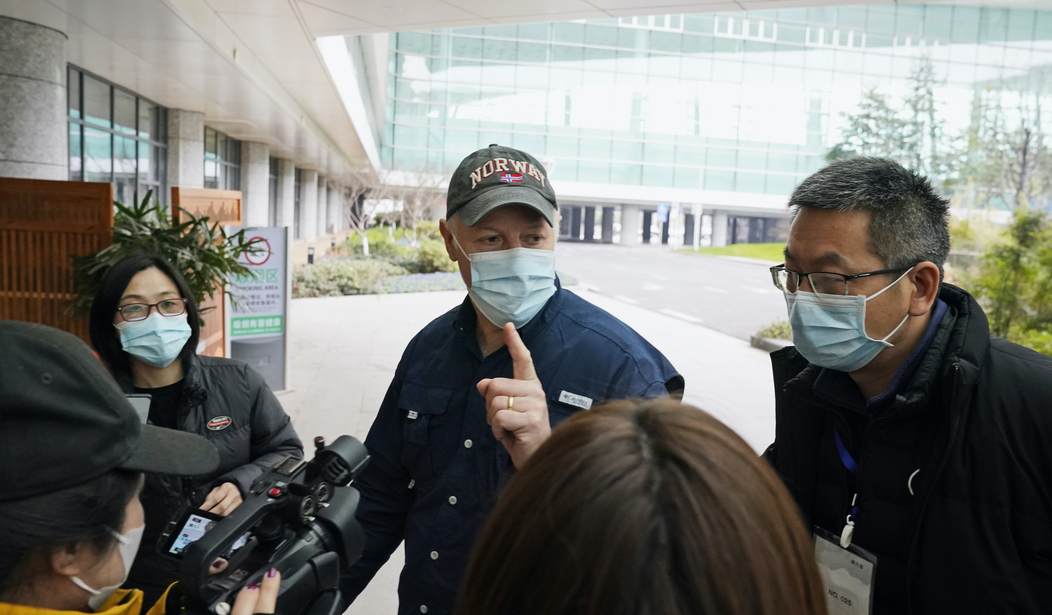This story published today by NPR is a bit of a downer. It basically confirms what a lot of us already suspected, i.e. there’s not much hope of any future transparency from China into where the coronavirus originated. The story notes that there was talk at the recent G7 meeting about “timely, transparent” study of how the virus originated but it appears China’s only reaction to that is to continue to ignore it.
“We’re at an impasse,” says Lawrence Gostin, a professor of global health law at Georgetown University and director of the World Health Organization Collaborating Center on National and Global Health Law. “China is implacably opposed to a continued investigation and certainly opposed to one that’s fully transparent.”…
China has “dragged its feet” on the questions of the origins of the virus all along and sees this ongoing debate over pandemic origins in “stark political terms,” so there’s no reason to assume that would change now,” says Gostin of Georgetown. And that attitude has become more deeply entrenched since speculation over whether the virus leaked from a lab in Wuhan has gone mainstream, he says.
It took a full year to get the WHO team into China the first time and what they got was a guided tour in which Chinese scientists shared their conclusions and refused to give the WHO team any direct access to samples. The result of that visit was a report which determined it was more likely the virus had originated elsewhere and traveled to China via frozen food than that it had escaped from the Wuhan Institute of Virology. And according to China, that it. They are done and expect other countries to start looking for the origin anywhere but in China.
At the World Health Assembly, a representative from China called for researchers to now take a global scope in studying the origins of the virus.
“China’s part has been completed. China supports the scientists to conduct a global origin tracing cooperation. We call on all parties to adopt an open and transparent attitude to cooperate with the WHO in origin tracing,” he said, according to a translation of his remarks.
NPR suggests there are two possible responses to this. One is to try to diplomatically approach the issue and get China to reconsider. The other option is to get tougher:
“We need to call them out,” says Jamie Metzl, a senior fellow at the Atlantic Council. “If China continues to obfuscate and to deny the world the possibility of the comprehensive investigation that we need, it would be entirely appropriate for there to be some penalties, whether economic, trade or otherwise.”
The Biden administration’s 90 day review of evidence about the origin of the virus might be an attempt to lay groundwork for that second approach. Juliette Kayem, a professor at Harvard’s Kennedy School of Government told NPR, “We’re not going to war with China over this, but what it can do is put pressure on the WHO about how it conducts itself in these kinds of investigations and how China is not to be believed anymore.” She added, “If the WHO hasn’t learned that now, then we’re in big trouble.”
So maybe the WHO will get the message that China can’t be trusted (in case they haven’t already) but what will that accomplish? Will another WHO team, one which is more skeptical of China, be allowed in to investigate? The answer is almost certainly no. China is very happy with what it got from the first WHO report. In fact its top spokespeople have been repeated those conclusions almost every day. Here’s Zhao Lijian’s statement from earlier today: [emphasis added]
Zhao Lijian: Researcher Shi Zhengli of the Wuhan Institute of Virology, Chinese Academy of Sciences, denounced the “lab leak theory” as baseless in the interview on June 14. I want to stress that in March, the WHO released the origin-tracing study report of the China-WHO joint mission, drawing a clear conclusion that lab leak is extremely unlikely. The report was co-authored by more than 30 top global experts in various fields. It is widely representative and highly professional. Regrettably, some in the US have chosen to ignore the report, and have been hyping up the “lab leak theory” and politicizing the origin-tracing issue. This constitutes an affront to WHO-led origin-tracing study, a serious travesty of scientists and the spirit of science, and a major damage to the solidarity of the international community in the fight against the epidemic. If the US is truly transparent and responsible, it should be as open as China and immediately invite international experts to Fort Detrick and other places in the US to conduct a detailed investigation.
The reference to allowing international experts to Fort Detrick isn’t new. China has been pushing this line for several weeks. The message is pretty clear: We’re as likely to allow an unfettered glimpse into the Wuhan Institute of Virology as you are into Fort Detrick. In other words, it’s never, ever going to happen so stop asking.
We’re just not going to get any further cooperation from China. The WHO report is the best outcome China could have hoped for and they are not going to roll the dice on a fresh investigation which might result in a less favorable outcome. So, unless we get a defector or leaked documents, the investigation into the origin of the most deadly pandemic in a century is probably going to remain at a standstill.









Join the conversation as a VIP Member